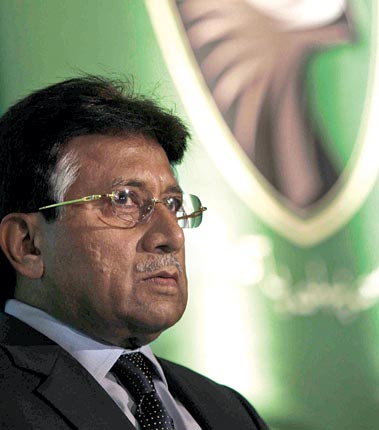Pakistan's general in exile plots an unlikely return to power
Former ruler Pervez Musharraf says he can lead country again, despite past blunders

Pakistan's former dictator Pervez Musharraf yesterday launched his bid for an unlikely return to power from exile in Britain with an apology to his nation for mistakes made before stepping down under the threat of impeachment after eight-and-a-half years in power.
Mr Musharraf, 67, said that he made mistakes during his final year in power that had "adverse impacts" on the nation but told several hundred cheering supporters that he was the man to lead his country out of the "darkness that prevails in Pakistan".
He did not say what those mistakes were, but the fact that he was launching his new political party in London highlighted his disconnection with the country that he ruled after seizing power in a bloodless coup in 1999.
Since 2009, he has been living in London, communicating with his supporters through Facebook, and carrying out a series of speaking engagements.
Yesterday, in the grand surroundings of a book-lined Whitehall club in central London, he spoke of launching a "jihad against poverty, hunger and illiteracy" but also admitted to having made decisions while in power that "resulted in negative political repercussions".
"I take this opportunity to sincerely apologise to the whole nation for those wrong decisions," he said.
"Only God is infallible. Human beings make mistakes and I did make those few mistakes at the end for which I have apologised. I have learned my lessons and I am very sure I will not repeat them again."
His current standing in Pakistan means that he is unlikely to have the opportunity. Pakistan's High Commissioner in Britain, Wajid Shamsul Hasan, said bluntly that Mr Musharraf was "yesterday's man" and without the clout that he used to wield.
Mr Musharraf yesterday readily admitted that his popularity plunged during his final year in power when he imposed emergency rule across Pakistan, tussled with the judges and courts and sent troops into television stations.
However, earlier this week he said that he had no regrets about the security given to Benazir Bhutto for the political rally in 2007 where she was killed three months after returning to the country to fight an election campaign. A damning UN report said that her assassination could have been prevented and blamed his security forces for failings.
Despite his apology yesterday, it is unclear when he will be able to return to Pakistan as he faces a potential trial for treason over his seizure of power. He has said that he will return before elections in 2013 but his influence over the military, his former powerbase, is unclear, as many of his allies have retired. "There is no case against me in the courts of Pakistan today," he said. "Whatever cases there have been, have been motivated politically. ... I am prepared to face anything. I am not afraid."
Earlier, he said the only way to tackle Pakistan's problems was further to bolster the army's role. He also spoke about the importance of boosting agriculture and bringing more investment to the impoverished nation of about 175 million. He also talked of the need to keep tackling terror, but gave no specifics. "There will be zero tolerance for extremism," he said.
The launch of the new party, the All Pakistan Muslim League, comes amid turmoil in Pakistan. The civilian government has come under intense criticism over its handling of the devastating floods this year, in sharp contrast to the response of the powerful military which mobilised to move people and take supplies to some of the millions who were affected.
Powerful landowners with connections to the ruling party were accused of diverting floodwaters to protect their own lands and submerging villagers.
The party launch yesterday played on the weakness of the current government of President Asif Ali Zardari with a big-screen presentation of his claimed achievements while in power including the building of dams and his address to the nation after the floods with a pledge from his personal fortune.
To chanting from his supporters – overwhelmingly British-resident Pakistanis – the film trumpeted his economic record – including the opening of the first "seven-star hotel in Pakistan". But critics have accused Mr Musharraf doing too little to improve the country's stagnant economy while in power.
Mr Musharraf was Pakistan's leader when Islamist militants began attacking the state in earnest and was a key ally of the Bush administration's so-called war on terror after the September 11 terror attacks in 2001.
While in power, Mr Musharraf launched several offensives against militants in the north-west, but struck deals with insurgents when it became clear the army could not win by sheer force. Pakistan's army and the current government, however, arguably have been more forceful and successful in flushing out al-Qa'ida operatives and Taliban supporters.
Subscribe to Independent Premium to bookmark this article
Want to bookmark your favourite articles and stories to read or reference later? Start your Independent Premium subscription today.

Join our commenting forum
Join thought-provoking conversations, follow other Independent readers and see their replies